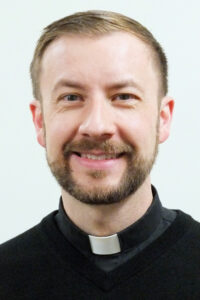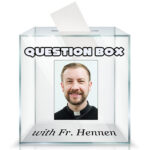By Fr. Thom Hennen
Question Box
What is the Church’s teaching on why only Catholics can receive the Eucharist?

It is a very reasonable question to ask why we would ever want to withhold something that we believe is so good — indeed, Christ himself — to anyone who desired this great gift. At the same time, either the very act of receiving Communion means something or it doesn’t. As Catholics we believe it does mean something. It is more than receiving Jesus sacramentally. It is also a kind of “oath” we are making to God. That is what the Latin word sacramentum means. Our Communion is an embodied statement of our Catholic faith, not only in the true presence of Christ present in the Eucharist but of our full communion with the Catholic Church.
In my parish ministry, I have been asked occasionally about the Church’s policy on “open Communion,” that is, if all are invited to share in the Eucharist. This especially comes up in the context of weddings and funerals. I usually have a good idea of what I am dealing with from the moment I say, “The Lord be with you.” If the gathering responds with awkward silence, then I know.
In this case, before the Communion Rite I will often make a short announcement such as, “At this time I would invite those who are practicing Catholics to come forward to receive Communion. Those who are not Catholic are welcome to come forward for a blessing if you feel comfortable doing so. And let us pray for greater unity among all Christians.”
When I have more opportunity beforehand to explain this, I try to appeal to a person’s sense of personal conscience and religious liberty. Suppose, instead of inviting someone up to Communion I ask them to repeat after me a statement of belief affirming their Catholic faith and relationship to the Church. Put this way, people who might have frowned on the Church’s “exclusivity” start to realize that, out of deep respect for them, we do not just say “come one, come all!” We never want to put someone in the position of making a statement he or she is not truly prepared to make.
We walk with our catechumens and candidates who are coming into the Church for the better part of a year or more to prepare them to make that statement, first in their baptismal promises or profession of faith and then in their first Eucharist. Why would we go through all that trouble if it really doesn’t matter? What does it say about their efforts and journey to the faith?
I love watching travel shows, in which awkward outsiders visit interesting, far-away places and encounter the people, their food, culture, customs and religious practices. Often the host is not particularly religious and yet will participate in religious ceremonies that, personally, I would find problematic. They go along with it, as though it were perfectly innocent or just the polite thing to do. Maybe the people who are putting them up to this don’t have any qualms about inviting them to participate (for example, to make some ritual offering to a local deity), but again, either this means something or it doesn’t, and for us as Catholics it means something.
In the end, it is true that “all are welcome.” And yet, they are welcome to something, something real, not vague or meaningless. They are welcome after proper preparation and disposition to a life in full and joyful communion with the body of Christ!
(Father Thom Hennen serves as the pastor of Sacred Heart Cathedral in Davenport. Send questions to messenger@davenportdiocese.org)










